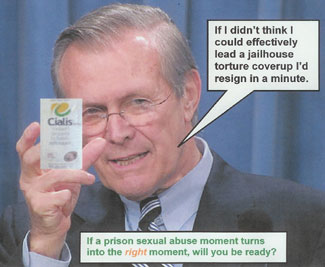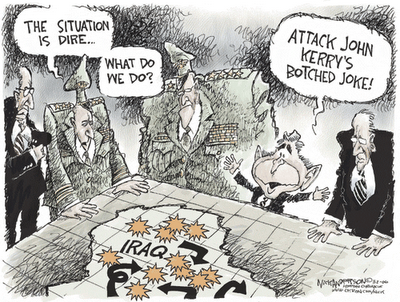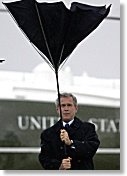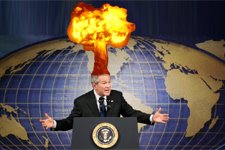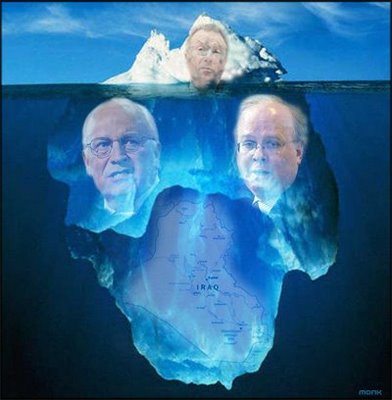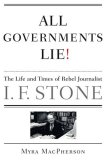

Below is my
"Loyal Opposition" column from
TomPaine.com....
A Real October Surprise
By David Corn
October 25, 2006My fellow Americans,
As you might have heard, my White House reached an important decision this week. From now on, neither I nor any member of my administration will use the phrase "stay the course" when referring to United States actions in Iraq. Our repeated use of that term had allowed our opponents to charge that this administration is inflexible and stubborn, and not interested in pursuing new options and strategies in Iraq.
At first, administration officials and I were reluctant to renounce our vow to "stay the course." But then I realized that our hesitancy only proved the point. And as I thought about this change in message, it occurred to me that not only was such a change warranted, it ought to pave the way for other necessary changes. After all, the course we're on is obviously not working as I had expected and hoped. We invaded Iraq over three-and-a-half years ago, yet the violence there--now spreading through horrific sectarian conflict--has intensified. Heck, let's be honest and call it a burgeoning civil war. American citizens of this nation are right to feel discouraged, disappointed and frustrated. And the people of Iraq are right to be angry.
So I intend to do more than expunge those three words from the lexicon of this administration; I intend to forge a new course.
Before we move ahead, though, we must come to terms with what has brought us to this difficult point.
We can only succeed in Iraq and in the greater struggle against al-Qaida--note that I am also no longer using the vague and meaningless phrase "war on terror"--if we have a sound policy based on competence and credibility. Until now, the actions of this administration have caused Americans and people in other nations to doubt the United States on both counts. That must be changed. So let me state clearly: The war in Iraq was a mistake. There were no weapons of mass destruction. The prewar intelligence was not conclusive, and I and other administration officials were wrong to state there was "no doubt" about it. We were wrong to declare that Iraq was a "gathering threat." In fact, as we now know, there was nothing gathering about it.
Certainly, Saddam Hussein, a murderous tyrant, presented a problem. But he was not the "immediate" and "direct" danger my administration said he was. Officials of this administration--myself included--epeatedly suggested that his brutal regime was in league with the mass-murdering evildoers of 9/11. That, too, was not the case.
By making these assertions and then repeatedly stating in the post-invasion period that progress was under way (an unduly optimistic assessment), this administration undercut its own credibility. But even if we started this war in error and committed subsequent missteps, none of that can be undone. We are where we are today. And if we are to lead the rest of the world in seeking solutions to the problems in Iraq and elsewhere, we must regain our credibility. That can only come with a frank admission that what we previously said and did was false and misguided.
Then there is the matter of competence. The United States is fortunate--blessed--to be the most powerful and influential nation in the world. This creates obligations--which we, as Americans, accept--and expectations as well. Millions of Iraqis are entitled to expect that the United States, after vanquishing the armies of Saddam Hussein, would be prepared to confront the ensuing and obvious challenges of securing, rebuilding and revitalizing Iraq, as Iraq attempts to transform itself into a functioning and stable democracy.
Sadly, the United States was not ready to take on these tasks and, worse, we made fundamental miscalculations--dissolving the Iraqi army, mounting a de-Baathification program that went too far and deploying an insufficient number of American troops following the initial military action--that shaped the landscape to our disadvantage, and, I am sad to say, to the disadvantage of the Iraqi people, who have suffered more than was necessary.
To move ahead, we must show the world--particularly our friends and allies in Iraq--that we believe in accountability and responsibility and, more important, that we can learn from our mistakes. So today I am announcing that I have requested and received the resignation of Defense Secretary Donald Rumsfeld. Of course, he alone is not to blame for our problems in Iraq. As commander in chief, I do assume full responsibility. But America is not a parliamentarian-style democracy. When policies fail, governments do not fall. Still, clearly a new team is needed.
I will be announcing Secretary Rumsfeld's replacement shortly, as well as other dramatic changes in the composition of my administration. And, while Dick Cheney will remain as vice president, I do expect his office to have less influence in the crafting of foreign policy. I've instructed my aides to revive the traditional working relationships between the State Department, the Defense Department and the National Security Council. My goals are two-fold: to ensure we have a strong, competent and well-coordinated national security team and to enhance global confidence in the United States’ ability to handle the challenges in Iraq and other parts of the world.
With bolstered credibility and competent leadership, this administration can start to take the steps necessary for resolving the mess in Iraq. We are now in the middle of an election season and both parties are fighting vigorously for control of Congress. I will not wait for election results to begin a bipartisan process of evaluating policy alternatives. Nor will I wait for the recommendations of the Iraq study group headed by former Secretary of State James Baker and former Representative Lee Hamilton. With U.S. troops and Iraqi civilians tragically dying at accelerating rates, every single day counts. Every hour counts. Starting tomorrow, I will be calling groups of Democrats and Republicans to the White House for extensive and meaningful consultations. I want to see what ideas others have. I want everyone to be part of this process: Nancy Pelosi, Harry Reid, Jack Murtha, Joe Biden, Ted Kennedy, Dennis Kucinich.
It was my administration that took us into Iraq, but what we face now is a problem for all Americans. To deal with it, I will also ask Bill Clinton, Madeleine Albright, and Al Gore to join us. And let me take a moment to note that I do realize that had it not been for those mis-designed butterfly ballots in Palm Beach County, Al Gore would likely be president today and we would not be stuck in Iraq.
I will extend the discussion--and the search for alternatives--beyond Washington. If we are to reach any resolution in Iraq, we need to better involve our allies, other powers and Iraq’s neighbors. And this does mean talking to all of its neighbors, including Iran and Syria, despite our well-founded differences. I have asked my father for advice on this, and he has volunteered to serve as my emissary to the nations of the region. He knows the Middle East and its leaders well. When I asked him to take on this assignment, he said, "Son, better late than never." I could not agree more. And I can now say without equivocation, “"Dad, you were right not to take the war to Baghdad in 1991."
Staying the course is now history. I will not merely tweak the rhetoric; I will rethink our policies and chart a new path ahead. And we must face facts: Total victory may not be possible. We might have to settle for less—despite the loss of nearly 3,000 brave U.S. soldiers and tens of thousands (if not hundreds of thousands) Iraqi civilians.
After being in charge of this war for more than three years, I've learned Iraq is not black and white. There are no easy solutions. Indeed, there may be no good solutions at all. We might have to settle for a muddle. But with the two years I have left as your president, I will do all I can to make sure it is the best muddle possible. As I do so, I ask Americans for their forgiveness, forbearance and support. God bless America and God help us.
Posted by David Corn at October 25, 2006 02:02 PM

